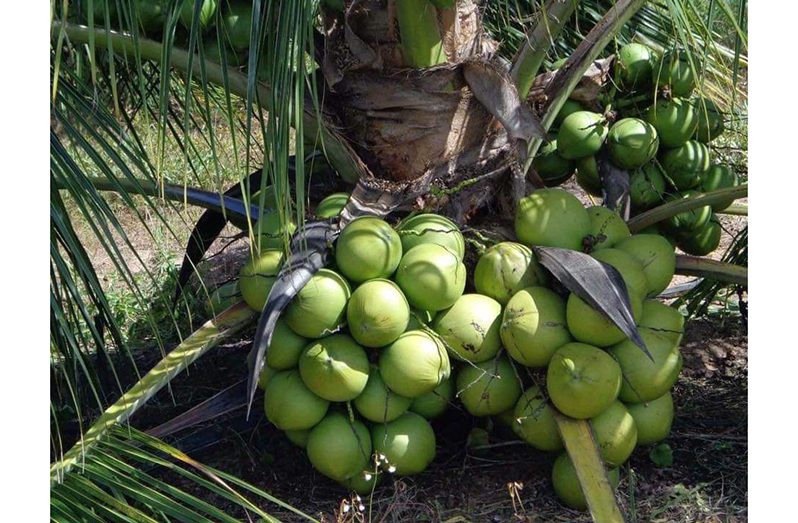–as second batch of Brazilian Green Dwarf coconuts arrive
THE second set of 1000 Brazilian high-yielding, early-bearing Green Dwarf coconut seeds was received (by Guyana) recently. The project was funded by the Inter-American Development Bank (IDB) through the Agriculture Sector Development Unit (ASDU) that falls under the Ministry of Agriculture.
In an invited comment, Minister of Agriculture, Zulfikar Mustapha, said he was delighted, so far, with the outcome of the intervention since it was one of the “positive spin-offs” that resulted from the Agri-Investment Forum that was held in Guyana earlier this year. The introduction of an improved, early-bearing, high-yielding variety of coconut was long overdue, since Guyana’s traditional coconut varieties were more than 40 years old and urgently needed significant improvement in many cases.
This induction of new genetic materials into the country’s coconut sector would improve the current genetic base for research and make it possible for our farmers to be directly involved in this welcome intervention.
The Minister further emphasised that Guyana’s Coconut Industry was expanding phenomenally. In 2021, the acreage increased by 2005, with an additional 117 new farmers coming on board.
In 2022 as of the end of October, the acreage increased by 2,762 and 319 new farmers got involved in coconut production. With the current trajectory, the Agriculture Minister is confident that this important non-traditional sector will continue expanding.
To demonstrate the Government’s continued support, in 2023, the Ministry of Agriculture will look very seriously at increasing the importation of the variety from Brazil, as well as explore, fully, the possibilities of importing other high-yielding varieties that are suitable for our local conditions from different parts of the world, such as Asia and Mexico
General Manager of Hope Coconut Industries Limited (HCIL), Ricky Roopchand, explained that “the IDB- funded second batch of
1000 seed nuts will be germinated at Hope Estate’s Coconut Nursery under the close supervision of ASDU.
He further explained that, as part of the National Coconut Decentralization Programme for the year 2023, demonstration plots, using the new variety, will be established in selected farmers’ fields around the country in all ten administrative regions of Guyana where they will be closely monitored by staff of ASDU, HCIL, Caribbean Agricultural Research and Development Institute (CARDI) and the National Agricultural Research and Extension Institute (NAREI).

Mr. Roopchand also emphasised that the high-yielding green dwarf variety took 15 years to develop and was excellent for water, oil and copra production.
“Our local varieties produce an average of between 350-500 mls. This improved variety from Brazil produces an average of 750 mls. One plant can produce an average of 250 – 300 nuts per year,” he noted.
He expressed his deep appreciation and gratitude to the IDB for supporting this needed intervention as well as to COHIBRA ( Technology in the Production of Coconut Trees) and, by extension, the Government of Brazil, for sharing, freely, the new, improved variety, which augers well for improving the genetic base for both research and production.
In 2023, Hope Estate is planning to collaborate closely with the Ministry of Agriculture to source one 40- foot container of this seed nut, which will be approximately 14,000. This planned intervention will ensure that more farmers benefit directly and accelerate the multiplication of the variety in Guyana.
General Manager, Roopchand said it makes economic sense to import improved varieties, where ever possible, into the system since breeding new varieties takes an average of 15 years, which is very time-consuming, labour-intensive and costly.
“If we as a country want to be competitive and stay ahead of the curve, this approach will have to be adopted until Guyana can develop its own breeding programme,” he added.



.jpg)









